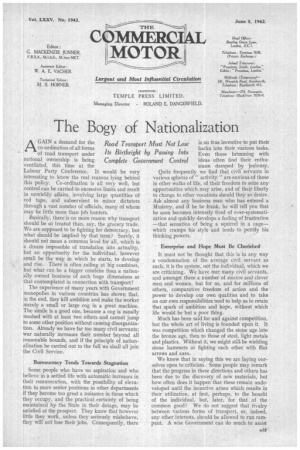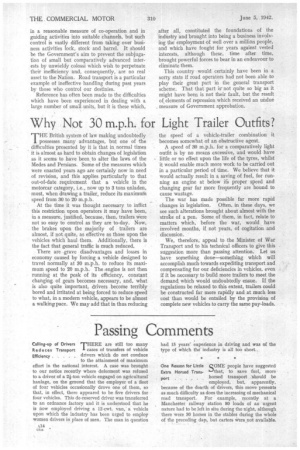The Bogy of Nationalization
Page 15

Page 16

If you've noticed an error in this article please click here to report it so we can fix it.
AGAIN a demand for the co-ordination of all forms Road Transport Must Not Lose of road transport under Its Birthright by Passing Into national ownership is being Complete Government Control ventilated, this time at the Labour Party Conference. It would be very interesting to know the real reasons lying behind this policy. Co-ordination is all very well, but control can be carried to excessive limits and result in unwieldy affairs, involving large quantities of red tape, and subservient to minor dictators through a vast number of officials, many of whom may be little more than job hunters.
Basically, there is no more reason why transport should be so treated than, say, the grocery trade. We are supposed to be fighting for democracy, but what should be implied by that term? Surely, it should not mean a common level for all, which is a dream impossible of translation into actuality, • but an opportunity for the individual, however small be the way in which he starts, to develop and rise. There is often railing at big combines, but what can be a bigger combine than a nationally owned business of such huge dimensions as that contemplated in connection with transport? The experience of many years with Government monopolies in various countries has 'shown that, in the end, they kill ambition and make the worker merely a small or large cog in a great machine. The simile is a good one, because a cog is usually meshed with at least two others and cannot jump to some other position without causing disorganization. Already we have far too many civil servants; war naturally increases their number beyond all reasonable bounds, and if the principle of nationalization be carried out to the full we shall all join the Civil Service.
Bureaucracy Tends Towards Stagnation Some people who have no aspiration and who believe in a settled life with automatic increases in their remuneration, with the possibility of elevation to more senior positions in other departments if they become too great a nuisance in those which they occupy, and the practical certainty of being maintained by the State in their dotage, may be satisfied at the prospect. They know that however little they work, unless they seriously misbehave, they will not lose their jobs. Consequently, there is no true incentive to put their backs into their various tasks. Even those brimming with ideas often find their enthusiasm damped by jealousy.
Quite frequently we find that civil servants in various spheres of " activity " are envious of those in other walks of life, of their freedom to seize any opportunities which may arise, and of their liberty to change to other vocations should they so 'desire. Ask almost any business man who has entered a Ministry, and if he be frank, he will tell you that he soon becomes intensely tired of over-systematization and quickly develops a feeling of frustration —that sensation of being a squirrel in a cage— which cramps his style and tends to petrify his thinking powers.
Enterprise and Hope Must Be Cherished It must not be thought that this is in any way a condemnation of the average civil servant as such; it is the system, not the individual, which we are criticizing. We have met many civil servants, and amongst them a number of sincere and clever men and women, but for us, and for millions of others, comparative freedom of action and the power to develop our own qualities and to take on our own responsibilities tend to help us to retain that spark of ambition and hope, without .which life would be but a poor thing.
Much has been said for and against competition, but the whole art of living is founded upon it. It was competition which changed the stone age into the bronze age, then to those of steel, light metals and plastics. Without it, we might stilt be wielding stone hammers or fighting each other with flint arrows and axes.
We know that in saying this we are laying ourselves open to criticism. Some people may remark that the progress in these directions and others has been due to the discovery of new materials, but how often does it happen that these remain undeveloped until the incentive arises which results in their utilization, at first, perhaps, to the benefit of the individual, but, later, for that.. of the common good? We do not suggest that rivalry between various forms of transport, or, indeed, any other interests, should be allowed to run rampant. A wise Government can do much to assist in a reasonable measure of co-operation and in guiding activities into suitable channels, but such control is vastly different from taking over business activities lock, stock and barrel. It should be the Government's aim to prevent the subjugation of small but comparatively advanced interests by unwieldy colossi which wish to perpetuate their inefficiency and, consequently, are no real asset to the Nation. Road transport is a particular example of ineffective handling during past years by those who control our destinies.
Reference has often been made to the difficulties which have been experienced in dealing with a large number of small units, but it is these which, after all, constituted the foundations of the industry and brought into being a business involving the employment of well over a million people, and which have fought for years against vested interests, although these, time after time, brought powerful forces to bear in an endeavour to eliminate them.
This country would certainly have been in a sorry state if road operators had not been able to play their great part in the general transport scheme. That that part is' not quite so big as it might have been is not their fault, but the result of elements of repression which received an undue . measure of Government approbation.




















































